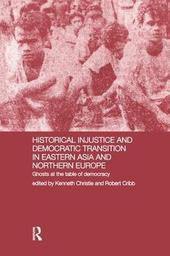
|
Historical Injustice and Democratic Transition in Eastern Asia and Northern Europe: Ghosts at the Table of Democracy
Hardback
Main Details
| Title |
Historical Injustice and Democratic Transition in Eastern Asia and Northern Europe: Ghosts at the Table of Democracy
|
| Authors and Contributors |
Edited by Kenneth Christie
|
|
Edited by Robert Cribb
|
| Physical Properties |
| Format:Hardback | | Pages:224 | | Dimensions(mm): Height 248,Width 162 |
|
| Category/Genre | History of specific subjects |
|---|
| ISBN/Barcode |
9780700715992
|
| Classifications | Dewey:321.809 |
|---|
| Audience | | Undergraduate | | Postgraduate, Research & Scholarly | | Professional & Vocational | |
|---|
|
Publishing Details |
| Publisher |
Taylor & Francis Ltd
|
| Imprint |
RoutledgeCurzon
|
| Publication Date |
1 August 2002 |
| Publication Country |
United Kingdom
|
Description
The twentieth century was scarred by conflict. Across the globe, dozens of societies have been transformed by political processes involving intense violence, including civil war, massacre, murder and detention. In the process, ethnic groups, political ideologies, social classes and other human categories have been excluded from political power in their societies. The global wave of democratization which took place towards the end of the century brought a welcome end to repression in many parts of the world, but the effects of past repression linger like ghosts at the table of democracy. This volume juxtaposes one society - Finland - in which the process of coming to terms with the ghosts of the past seems to be coming at last to an end, with several societies - the Baltic states, Mongolia, China and Indonesia - which have only just begun this process. Finland's civil war of 1918 left tons of thousands dead while it bitterly divided Finnish society. Antagonism, resentment, triumphalism and denial jostled with each other for space in Finnish politics for three generations, through a second world war and through Finland's remarkable economic transition in the last decades of the century. Only in the closing years of the century did Finns begin to see the civil war as a common tragedy for the nation as a whole rather than as the triumph of some Finns over others. The Baltic states have emerged from nearly five decades of Soviet repression, Mongolia from seven decades. A hesitant democratization at the local level is under way in China after the turmoil of the Cultural Revolution. And the New Order of President Suharto in Indonesia, which was founded on the massacre of half a million communist in 1965-66, has given way to a turbulent near-democracy. This volume explores the ways in which these societies have begun to reconcile a terrible past with a democratizing future.
Author Biography
Kenneth Christie lectures in the Department of Comparative Politics, University of Bergen, Norway. Robert Cribb is Reader in Southeast Asian history at the University of Queensland.
|